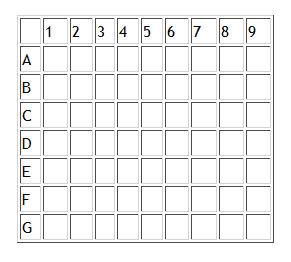"Battleword"
by Carol Goodhew R.S.A.Dip., and Mark Broster (aged 13). Based on the co-ordinates game "Battleships".
Purpose: to practise spellings that have already been taught.
Aim: to find out where your opponent has hidden their words in the grid.
1) Choose, in advance, the group of spellings to be practised. 4-8 words are best, depending on the age and ability of the student.
2) Prepare suitably sized grids. If 2 people are playing, each will need a pair of grids. Continue vertical alphabetic co-ordinates down second grid to avoid confusion between grids. Number horizontal co-ordinates. See example:


3) Each player writes the same chosen words on a line in between their two grids. Check for correct spellings at this stage.
4) One player hides the words in his top grid. One word per horizontal line in any order and any position as long as it fits in. Likewise, the other player hides the words in his bottom grid.
5) Players take turns to say one square reference eg B 6. the other player sayds which of his letters (or nothing) is in that square. The letter- or, for nothing, a blob- is entered in the appropriate grid.
6) Players try to predict where their opponents' letters are and can fill in the rest of the letters of words if they are sure of the positions.
7) The first player to find and mark the positions of all his opponent's words is the winner. These need to be checked for confirmation.
This game can be played by any age of student. It can also be played with a group where the teacher puts a grid on the board and each student has one grid plus a list of the words which are to be found. The students take turns to identify a square and the teacher (who has prepared the word positions on a separate piece of paper) marks the relevant letter or blob on the board. The winner is the first student to find out the correct positions of the teacher's words.

